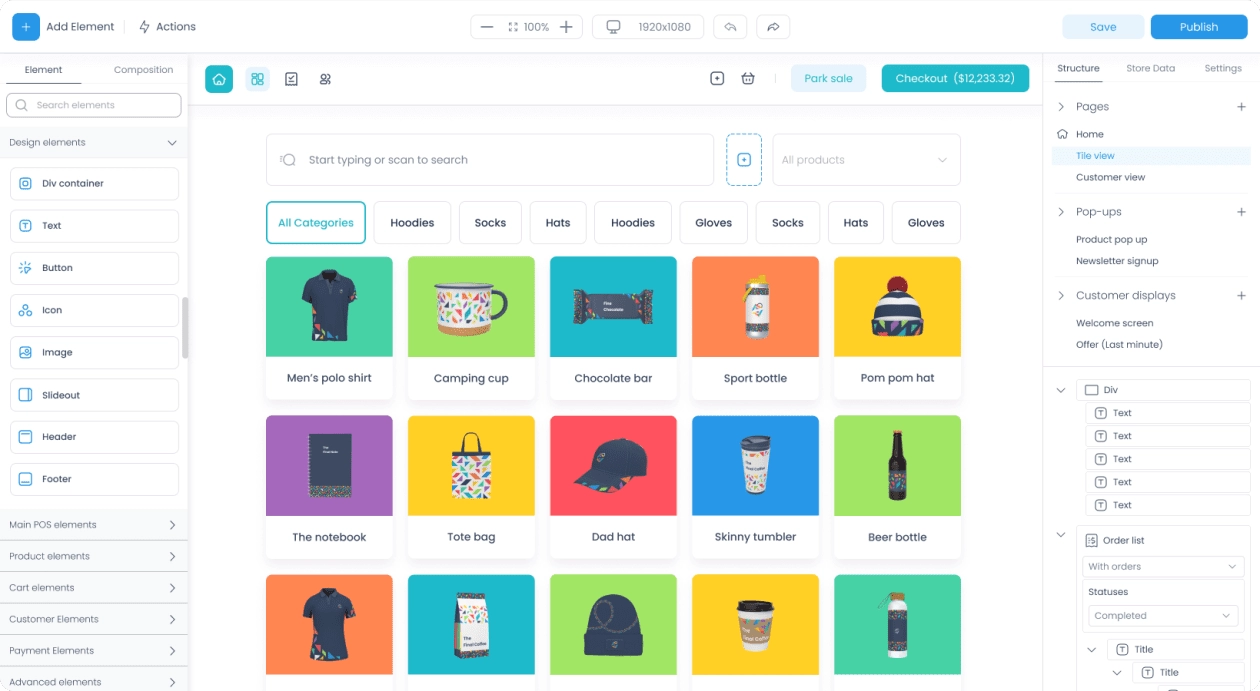Who Makes Point of Sale Hardware Top Manufacturers and Features 2025

If you’re wondering who makes point of sale hardware that’s reliable, affordable, and ready to power your business in 2025, you’re in the right place. Choosing the right POS hardware manufacturer isn’t just about picking a device—it’s about securing a system that speeds up checkouts, protects payments, and scales as you grow. Whether you run a small retail shop, a bustling café, or a mobile food truck, knowing the top names in cash register suppliers helps you cut through the noise and invest smart. Ready to discover trusted brands and what sets them apart? Let’s dive in.
POS Hardware Essentials What to Look for Before Buying

Choosing the right point of sale hardware is critical for any retail or small business. The right setup speeds up checkout, keeps data secure, and fits your daily workflow without hassle. But with so many options, it’s easy to feel overwhelmed. Let’s break down the core components, the must-have features to check, and what local US retailers should keep in mind.
Core Components of POS Hardware
A solid retail POS system isn’t just one device—it’s a combination of key hardware pieces working together smoothly:
- POS terminals: The main device where sales get recorded, often a touchscreen all-in-one or a countertop computer.
- Touchscreens: User-friendly interfaces that allow fast, intuitive item selection.
- Cash drawers: Secure compartments to store cash, often connected to the terminal and opening only during transactions.
- Receipt printers: Commercial-grade printers that spit out receipts quickly and reliably.
- Barcode scanners: Essential for fast product look-up and inventory management.
- Payment readers: Devices supporting EMV chip cards, NFC contactless payments, and mobile wallets.
Key Criteria When Choosing POS Hardware
Before you invest, focus on these critical factors to ensure long-term success:
- Durability: Hardware should be built to last, especially for busy retail or food service environments.
- Compatibility: Confirm that devices work seamlessly with your chosen POS software and payment processors.
- Security: Look for EMV compliance and data encryption to protect customer payment info and meet US regulations.
US Regulations and Local Retail Needs
In the United States, retail POS hardware must meet strict standards around payment security and accessibility. Small retailers should also consider:
- PCI compliance for secure card payments.
- State-specific regulations around sales tax reporting.
- Hardware suppliers with local support to speed up repairs and replacements.
Quick Tip Budget Starter Kit Under 1000 USD Featuring SDLPOS Basics
If you’re launching a new store or switching systems on a budget, consider starter POS hardware bundles for under $1000. One reliable option is SDLPOS, a US-based supplier offering:
- Durable terminals and touchscreens.
- Integrated cash drawers and receipt printers.
- Barcode scanners and EMV payment readers.
- A full package that’s ready to use out of the box, perfect for small businesses wanting quick setup with solid support and fast delivery.
Starting smart and local helps avoid common pitfalls like incompatible devices or weak after-sales service.
Top 8 Point of Sale Hardware Manufacturers in 2025 Reviews and Recommendations

When choosing POS hardware, knowing the leading manufacturers helps narrow down options and match your business needs with the right tech. Here’s a quick rundown of the top players in 2025, focusing on POS terminal manufacturers, retail POS hardware suppliers, and cash register brands relevant for U.S. small to medium businesses.
Square
Ideal for: Mobile businesses and startups
- What they offer: Affordable, mobile-first card readers that connect easily to smartphones and tablets.
- Pros: Simple setup, great for pop-ups and food trucks, no contract needed.
- Cons: Limited to mobile device use, fewer traditional hardware options like full terminals.
- Use case: Small vendors needing easy, portable EMV compliant payment terminals.
Lightspeed
Ideal for: Retailers needing an integrated solution
- What they offer: Retail-focused POS hardware bundles with strong inventory management built-in.
- Pros: Powerful software and hardware integration, good support for multi-store setups.
- Cons: Higher cost than some competitors.
- Use case: Medium-sized retail stores wanting a seamless, all-in-one system.
Toshiba
Ideal for: Large enterprises and big box stores
- What they offer: High-performance, durable terminals built for heavy daily use.
- Pros: Enterprise-grade hardware with strong reliability.
- Cons: Expense can be high, geared toward large operations.
- Use case: Enterprise retailers with complex POS needs and heavy transaction volume.
POS-X
Ideal for: Businesses wanting customizable, US-made hardware
- What they offer: Flexible touchscreen systems and POS accessories manufactured in the U.S.
- Pros: Excellent customer support and customization options.
- Cons: Pricier shipping and hardware costs.
- Use case: Those valuing American manufacturing and hands-on service.
Hisense ICS
Ideal for: Startups and budget-conscious buyers
- What they offer: Modular POS components sourced from Asia focusing on affordability.
- Pros: Good value for money, easy to scale with modular parts.
- Cons: Limited local support and longer shipping.
- Use case: New businesses prioritizing cost-efficiency in POS hardware bundles.
PENETEK
Ideal for: Food service operations
- What they offer: Touchscreen all-in-one POS systems customizable for restaurants and bars.
- Pros: Designed with hospitality in mind, user-friendly interfaces.
- Cons: Less suited for retail environments.
- Use case: Restaurants and cafes needing specialized touchscreen POS.
Advantech-AURES
Ideal for: Global operators needing flexible solutions
- What they offer: Open-platform POS terminals compliant with EU and US regulations.
- Pros: Versatile hardware adaptable to many industries, robust compliance.
- Cons: Larger minimum order quantities.
- Use case: Businesses operating internationally or with diverse needs.
SDLPOS
Ideal for: Small and medium U.S. retailers needing reliable cash registers
- What they offer: Affordable, US-stocked terminals focusing on quick delivery and robust warranties.
- Pros: 2-year warranties, strong customer support, local customization capabilities.
- Cons: Smaller hardware selection compared to global giants.
- Use case: SMBs looking for fast service, reliable cash drawer suppliers, and easy repairs.
Comparison Table of Top POS Hardware Manufacturers
| Manufacturer | Price Range | Key Features | Customer Ratings | Special Notes |
|---|---|---|---|---|
| Square | $50 – $500 | Mobile card readers, simple setup | 4.5/5 | Best for mobile and pop-ups |
| Lightspeed | $500 – $2000+ | Integrated inventory, retail focus | 4.2/5 | Strong for mid-size stores |
| Toshiba | $1000+ | Enterprise-grade terminals | 4.3/5 | Large retailers, high durability |
| POS-X | $400 – $1500 | Customizable, US-made hardware | 4.0/5 | Great support, higher cost |
| Hisense ICS | $300 – $1000 | Modular budget systems | 3.8/5 | Value for startups |
| PENETEK | $700 – $1500 | Touchscreen all-in-ones | 4.1/5 | Focused on food service |
| Advantech-AURES | $800 – $2000+ | Open platform, global compliant | 4.0/5 | Versatile, larger orders |
| SDLPOS | $350 – $1200 | Reliable cash registers, quick delivery | 4.4/5 | Local customization edge |
This snapshot highlights the best POS hardware makers tailored for U.S. small business needs in 2025. For most local retailers, balancing price, support, and compliance is key—where SDLPOS often shines with its fast shipping, solid warranties, and customizable options. If you want an affordable starter kit or are scaling up, these manufacturers cover everything from mobile solutions to full enterprise setups.
How to Select the Right POS Hardware Manufacturer for Your Business Needs
Choosing the right POS hardware manufacturer is crucial for smooth daily operations and long-term success. Here’s a simple step-by-step framework to help you find the best fit for your business size, type, and budget.
Step-by-Step Decision Framework
1. Know Your Business Size and Type
Small cafés and retail shops often need compact, mobile-friendly POS terminals and simple cash drawers.
Larger stores or restaurants might require enterprise-grade hardware with robust barcode scanners and integrated receipt printers.
2. Define Your Budget Tiers
Entry-level setups can start under $1,000 with basic card readers and terminals.
Mid to high tiers might include customizable touchscreen POS systems with strong inventory and payment integrations.
3. Check Software Compatibility
Ensure the hardware works smoothly with your current or preferred POS software to avoid costly switchovers.
Look for manufacturers offering open-platform devices that support popular retail software.
4. Evaluate Key Features
Durability, security compliance (like EMV payment terminal standards), ease of use, and customer support availability.
Modular POS solutions add flexibility if you plan to scale your business.
Common Pitfalls to Avoid
Avoid cheap imports without reliable support — they often lead to downtime and repair delays.
Skimping on warranty and maintenance options can cost more in the long run.
Ignoring local suppliers risks longer repair times and higher shipping costs. Prioritizing manufacturers like SDLPOS, a trusted cash register supplier based in the U.S., means faster repairs and accessible customer service.
Real Business Example
A New York City café switched to SDLPOS hardware and saw a 40% reduction in checkout time. The streamlined terminals and quick customer support helped speed up daily transactions, improving customer satisfaction and staff efficiency.
FAQ
Is SDLPOS a top cash register supplier?
Absolutely. SDLPOS stands out for offering affordable, reliable US-stocked terminals, backed by quick delivery and 2-year warranties. Their local focus means faster, hassle-free support tailored specifically for U.S. small and medium businesses.
Following these steps will help you pick a POS hardware manufacturer that fits your business needs and keeps your operations running smoothly.
Trends Shaping POS Hardware in 2025 Innovations and Local Market Demands
The landscape of POS hardware is evolving fast in 2025, driven by new technology and changing customer habits across the United States. Here’s what manufacturers, including popular cash register suppliers like SDLPOS, are focusing on to stay ahead.
Contactless EMV and Payment Technology
One major trend shaping retail POS hardware is the continued growth of contactless EMV payment terminals. Customers expect faster, touch-free checkout options that support chip cards, NFC wallets like Apple Pay, and even QR code scanning.
- Contactless payments reduce lines and speed up transactions.
- EMV compliance remains critical for security and fraud prevention.
- Manufacturers are integrating these features into mobile card readers and fixed terminals.
AI-Driven Analytics Enhancing Business Insights
Another innovation is AI-powered tools built into POS systems. This tech helps retailers and foodservice businesses track sales trends, manage inventory better, and predict customer demand.
- AI analytics are becoming standard in POS hardware bundles.
- Real-time reporting improves decision-making without complex setups.
- Companies like SDLPOS are adding smarter software options paired with their hardware for a seamless experience.
Eco-Friendly and Sustainable POS Solutions
Sustainability is rising on the agenda for both manufacturers and buyers.
- POS hardware is now being made with eco-friendly materials.
- Energy-efficient peripherals, like receipt printers and cash drawers, are more common.
- This appeals especially to US businesses wanting to reduce their environmental footprint.
Local Habits Driving Mobile POS Growth
In urban US markets, mobile POS systems are booming. Food trucks, pop-up shops, and small retailers rely on mobile solutions to accept payments anywhere.
- Demand for mobile POS terminals in crowded cities and events is growing.
- Features like wireless barcode scanners and portable receipt printers cater to on-the-go sellers.
- These trends reflect changing buying habits and flexibility needs in retail and hospitality.
SDLPOS Innovation and Modular Upgrades
As a trusted cash register supplier in the US, SDLPOS is staying ahead with upcoming modular POS hardware solutions designed for smooth upgrades.
- New modular designs allow businesses to easily swap or add components like touchscreens or scanners.
- SDLPOS is rolling out systems that integrate effortlessly with cloud-based software, supporting remote management and updates.
- Their focus on affordability and reliability makes them ideal for small to medium-sized businesses aiming for future-proof setups.
In , 2025’s POS hardware market is all about faster, smarter, and greener solutions that fit the needs of US retailers and hospitality venues. Whether you want EMV-compliant payment terminals, AI-driven data, or portable systems for food trucks, top manufacturers and suppliers like SDLPOS are innovating to meet these demands.
